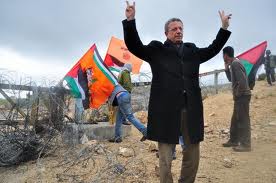Change the conversation, support rabble.ca today.
In a visit to Canada last weekend, Palestinian legislator and activist Dr. Mustafa Barghouti expressed his pessimism at the prospects of a future Palestinian state.
“My heart wishes for a two-state solution, but my mind tells me otherwise,” says Barghouti, who finished a three-day Canadian speaking tour organized by the Montreal-based NGO Canadians for Justice and Peace in the Middle East (CJPME).
Barghouti landed in Canada right after Israel announced that it intends to construct 3000 more settlements on the vital area of “E1,” which connects the West Bank to East Jerusalem, the theoretical capital of a future Palestinian state.
This announcement was made hours after the United Nations General Assembly voted overwhelmingly to give Palestine “non-state observer status.” Canada, the United States and Israel were among only nine countries to vote “No.”
Barghouti admits that Canada’s shift on foreign policy in the past six to seven years, characterized most vividly by its altered voting pattern in the UN, has left him and many of his colleagues “astonished.” Without a doubt, the Harper administration has confidently interpreted the occupation as a conflict where Israel fights courageously for its own survival against unruly and intransigent Arabs.
This flushing away of an international reputation has prompted criticism from retired career diplomats like Steve Hibbard, former head of Canada’s Representative Office in Ramallah. Hibbard says that Canada’s “extreme” foreign policy lost it a seat on the Security Council two years ago. He refers to those who carry out these policies as “coming out of a Reform Party mentality with no appreciation for the region and its people.”
Nonetheless, at the end of the day, it is still the United States that provides Israel with $3 billion in aid. It also allies with Israel on the diplomatic stage, and coughs up rhetorical “condemnations” when Israel expands in the West Bank. Ultimately, this American rejectionsim has a lot more to do with the UN bid than whatever Canada has to say about the matter.
Palestinian Authority (PA) President Mahmoud Abbas decided to bring the issue of statehood to the General Assembly after an unsuccessful attempt to persuade the Security Council to recognize Palestine as a member state.
Critics note that this diplomatic “victory” for Palestine is highly symbolic, will have no real effect to the situation on the ground, and may help fortify the position of the Palestinian Authority, an entity seen by many as becoming increasingly irrelevant. In fact, the Authority’s mandate as the governing entity in the Occupied Territories expired in 2000. Technically, they had no real popular mandate to even ask for observer status at the UN.
Many see Abbas’ efforts as first and foremost an attempt to salvage his own reputation, which took a hit when he told Israeli television that he wasn’t interested in his “right of return” to the Palestinian village he was evicted from in 1948. This elicited anger among Palestinians around the world and undoubtedly prompted, at least in part, Abbas to go to the UN.
“I disagree that this victory is just another ‘cheap gesture,'” Barghouti says. “The United Nations statehood bid and the legitimacy of the Palestinian Authority are two different issues.” Barghouti criticizes the Authority for their overly conciliatory posture toward the occupation, especially for its administration on behalf of Israel of a “security apparatus” that oppresses its own people.
However, Barghouti insists that one must understand “the mentality of an oppressed people who are looking for any sort of victory whatsoever.” He adds that with non-state observer status, the Palestinians are allowed to participate in General Assembly debates and stand a better chance of gaining access to UN agencies and the International Criminal Court.
He agrees, however, that facts on the ground remain bleak. Settlements and the Israeli “occupation matrix” of military checkpoints, roadblocks and the “Apartheid Wall” have long made a two-state solution improbable. The announcement of plans to build on E1 is just the latest chapter in a very old story.
“There is no two-state solution if this happens,” Barghouti says. Building on E1 will effectively bisect the West Bank by joining East Jerusalem and Ma’ale Adumim, one of the largest Israeli settlements on the West Bank.
Several Israeli administrations have tried over the past 20 years to do this. They have been unsuccessful so far due to interference from the United States. Unfortunately, President Barack Obama does not seem to want to take concrete steps to stop Israel this time.
Hopes that Obama would be more assertive toward the right-wing Netanyahu administration in his second term have proven to be sheer fantasy. The president flatly refused to criticize Israel in its latest invasion of the Gaza Strip, which resulted in at least 140 Palestinians dead and hundreds more wounded.
This leads many analysts and activists to conclude that the conflict can no longer be resolved by trying to obtain a separate Palestinian state, but rather through a “one-state solution” where Palestinians are given equal rights in both Israel and the Territories. Along with the Boycott, Divestment, and Sanctions (BDS) movement, this alternative has gained tremendous popularity in the last decade or so. Barghouti publicly urged Canadians to impose BDS on Israel, and acknowledged that the one-state scenario may not be as fanciful as some may suggest.
Either way, it is incumbent upon those who want to see a just peace in the region to pressure both Israel and its faithful benefactor to end the brutal occupation. If the U.S. withdraws its illegal economic support for Israel, it is not insane to suggest that the Palestinian people will have more leverage to obtain what has long been rightfully theirs.
Steven Zhou is a graduate student at Carleton University’s School of Journalism and Communication.
Photo: mondoweiss.org



